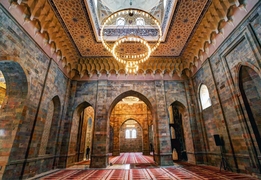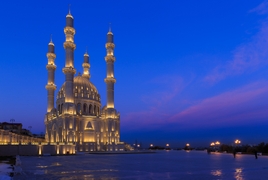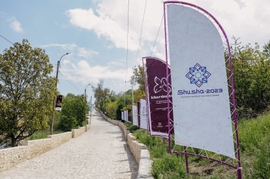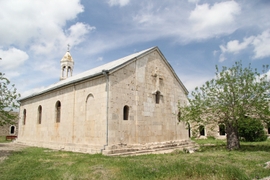The “Shusha - Cultural Capital of the Turkic World - 2023” year was officially launched on Friday in a solemn opening ceremony in Azerbaijan’s historic city of Shusha.
The ceremony was co-organized by TURKSOY, the international Turkic culture organization, and the Culture Ministry of Azerbaijan. Representatives from dozens of countries attended the event, which featured concerts, exhibitions, and presentations about Shusha.
TURKSOY Secretary General Sultan Raev stated that the Karabakh (Garabagh) region, including Shusha, is the cradle of art and music for the Turkic world.
“Because this magnificent city is the spiritual center and pride of not only Azerbaijan but the entire Turkic world,” Raev said, according to Azertag.
“In my opinion, Shusha is the heart of Azerbaijan. This year is also the 30th anniversary of TURKSOY. We intend to use this opportunity to introduce this historic city, which has been under occupation, and now regaining its freedom, as the cradle of culture, art, and music to both the Turkic world and the entire world,” he added.
As part of the year marking Shusha’s status as the Turkic world’s cultural capital, the city will host various events, including the First Turkic World Cultural Forum, the Third “Gorgud Ata” Turkic World Film Festival, and many other cultural programs and festivals.
Shusha recently hosted the Kharybulbul International Music Festival from May 9-11.
In November 2023, Shusha will pass on the title of “Cultural Capital of the Turkic World” to the city of Anev in Turkmenistan. Shusha was initially announced as the cultural capital of the Turkic world for 2023 in March 2022, following its recognition as the cultural capital of Azerbaijan in May 2021.
Shusha holds significant importance due to its geographical location and historical significance. Founded in the 18th century during the rule of Panahali Khan, a leader of the Azerbaijani Karabakh khanate, Shusha became a major cultural, economic, and administrative center of Azerbaijan. The city was strategically constructed at a height of 1,600 meters above sea level, and became the capital of the khanate in 1756-1757.
Shusha has long been a prominent center for administration, commerce, and culture in Azerbaijan. By the late 18th century, it emerged as a crucial trade hub in the South Caucasus region, with merchants bringing goods from cities such as Baku, Sheki, Nakhchivan, and Ganja. The city also established trade relations with the Ottoman Empire, Russia, Iran, India, and several European countries. Its merchants participated regularly in renowned trade fairs in Leipzig, Germany, and Nizhny Novgorod, Russia.
Additionally, Shusha played a vital role in the development of Azerbaijan’s carpet-weaving industry. It became the carpet-weaving center of the Karabakh region in the latter half of the 19th century, exporting carpets to global markets. Shusha’s carpets set the trend for ornamental and plot groups in local carpet-weaving. Renowned carpet-weavers from Shusha, such as Meshedi Bayram Gurban-oglu, Djabbar Haji Akber-oglu, Fatima Aga Sherif-gizi, and Ahmed Dashdamir-oglu, received accolades at international exhibitions in Paris and Moscow.
In terms of music, Shusha holds a position in Azerbaijani culture similar to Vienna in Austria or Naples in Italy. It is recognized as “the temple of Azerbaijani music” and a leading conservatory in the South Caucasus. Shusha nurtured the distinguished mugham tradition, a traditional Azerbaijani genre of vocal and instrumental arts that has influenced music across the Caspian and Middle Eastern regions. Notable figures from Shusha include Uzeyir Hajibeyli, the founding father of Azerbaijani-composed classical music and opera, as well as the renowned Azerbaijani poet Molla Panah Vagif and poetess Khurshudbanu Natavan.
Unfortunately, the city of Shusha, built and inhabited by ethnic Azerbaijanis, faced significant challenges after its occupation by Tsarist Russia in the early 19th century. The Russian Empire relocated Armenians from Iran and Turkey to Azerbaijani territories, including the Karabakh region. This resulted in the displacement of indigenous Azerbaijanis, and tensions escalated with a bloody terror and genocide campaign against Azerbaijanis in 1905-1906. Armenians made multiple failed attempts to capture Shusha between 1918 and 1920, during which Azerbaijanis heroically defended the city.
With the establishment of the Soviet Union in 1922, the repression of indigenous Azerbaijanis in the region intensified. Granting autonomy to the so-called Nagorno-Karabakh region and designating Khankendi as its center marginalized Shusha as the region’s administrative capital. Consequently, the quality of life for Azerbaijanis in Shusha significantly deteriorated, and many historical and architectural monuments belonging to Azerbaijanis were destroyed. The Azerbaijani population dwindled threefold over the next 50 years, from around 44,000 in 1917 to 14,000 in 1970, due to mass expulsions.
Following the dissolution of the Soviet Union in 1991, Armenia launched a military campaign against Azerbaijan, resulting in the occupation of 20 percent of Azerbaijan’s internationally-recognized territories, including the Karabakh region and Shusha. This brutal war lasted until a ceasefire was reached in 1994, during which over 30,000 ethnic Azerbaijanis were killed and one million others were forcibly expelled from their homes in a campaign of ethnic cleansing conducted by Armenia.
However, the tides turned on November 8, 2020, when the Azerbaijani army successfully restored Azerbaijan’s sovereignty over the city of Shusha. This victory came as part of a 44-day-long counter-offensive operation from September 27 to November 9, 2020, during which Azerbaijani forces liberated more than 300 settlements, including the cities of Jabrayil, Fuzuli, Zangilan, Gubadli, and Shusha. The liberation of Shusha played a crucial role in Armenia’s retreat and the cessation of hostilities. The war concluded with the signing of a tripartite agreement between Armenia, Azerbaijan, and Russia on November 10, 2020. Furthermore, as part of its obligations under the agreement, Armenia returned the occupied districts of Aghdam, Kalbajar, and Lachin to Azerbaijan.
The restoration of Shusha’s cultural significance and heritage is now a top priority for Azerbaijan. Efforts are underway to revive the city’s rich musical traditions, promote its historical and architectural treasures, and foster cultural events and festivals.


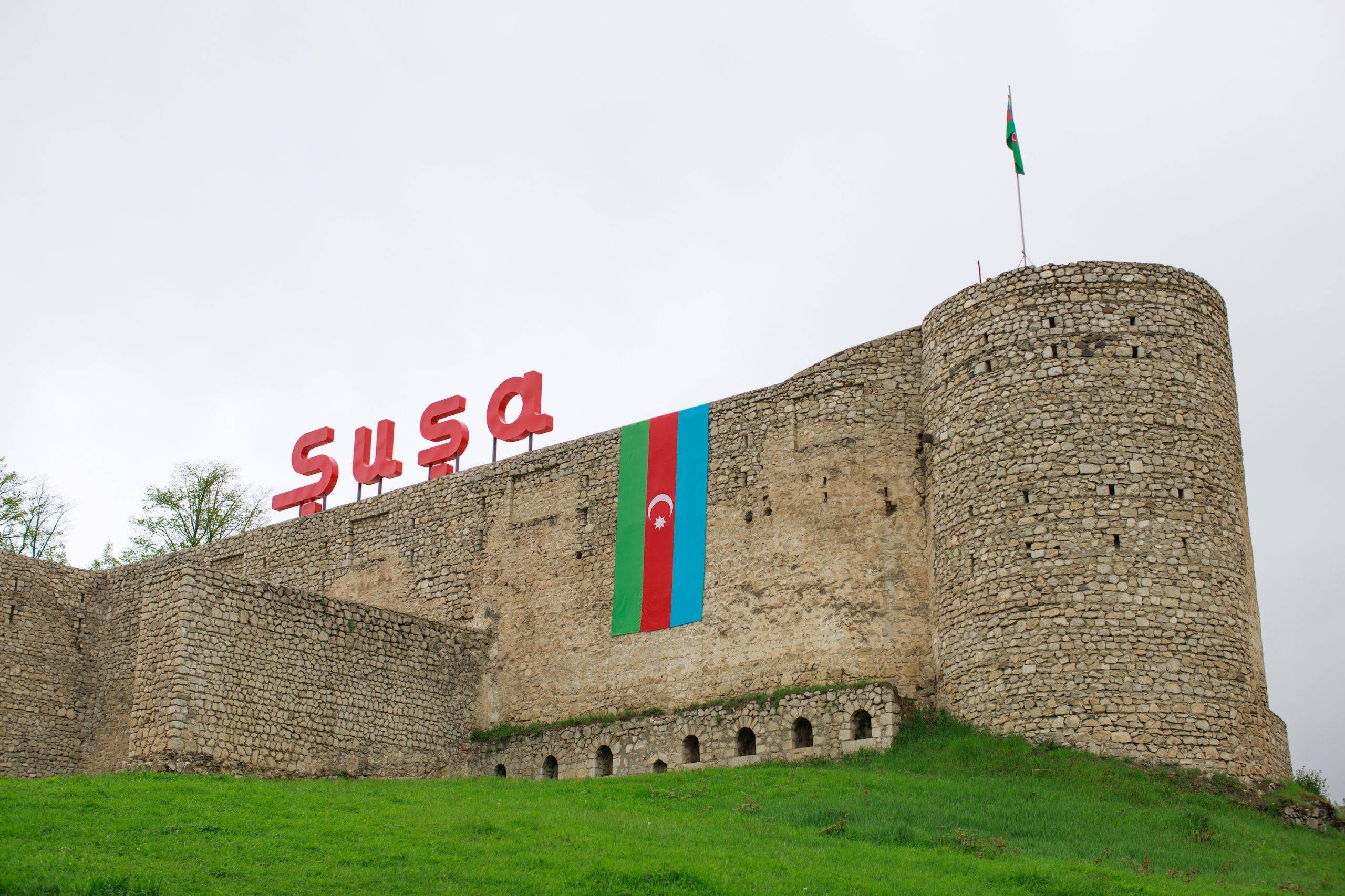




 The number of evacuees from flooded areas in Kazakhstan has reached 97,852 people, including about 32,856 children since March 27.
The number of evacuees from flooded areas in Kazakhstan has reached 97,852 people, including about 32,856 children since March 27.
 The Islamic holy month of fasting, Ramadan comes to an end this week with the celebration of a joyous festival called Eid (meaning “festival” in Ar...
The Islamic holy month of fasting, Ramadan comes to an end this week with the celebration of a joyous festival called Eid (meaning “festival” in Ar...
 Iran's senior military leaders described the drone and missile attack on Israel on April 14 night as “successful".
Iran's senior military leaders described the drone and missile attack on Israel on April 14 night as “successful".
 Iranian President Ebrahim Raisi warned Israel that it would face a "real and extensive" response if it makes any "mistake" following Tehran’s missi...
Iranian President Ebrahim Raisi warned Israel that it would face a "real and extensive" response if it makes any "mistake" following Tehran’s missi...
